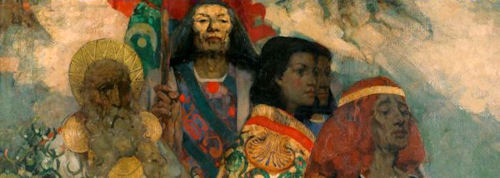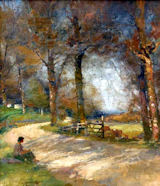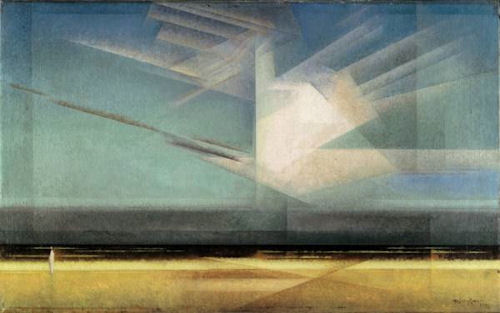




...
Lizzie, Lizzie ...
I'm sorry. I'm sorry, Lizzie ...
— Shush, Davey. Shush ... It's all right now.
Don't cry.
Where's Frankie?
We saw in the scene with the children investigating her bedroom wardrobe that Lizzie has a hot temper, and she retaliates with the most hurtful words imaginable to the predictable cursing and verbal abuse that follow upon the refusal to bring Frankie to see his father. Of course we've understood immediately that in fact Lizzie has two children and for safety's sake is forced to choose to protect the smallest and least destructive.
We've also realized with some surprise that Lizzie and Davey were married out of high school and that Lizzie has always looked up to Davey as the more intelligent member of the family — as well he may have been, once, when they were teenagers.
It's noteworthy that Davey's desire to say he's sorry to Frankie and immediate subsequent need to lash out at the people around him is the hidden side to the same coin — apology as act of aggression, transferring the burden of guilt from offender to innocent victim:—
I said I was sorry, didn't I? What more do you want from me?
I've said before in another context that the only authentic apology is an inner acknowledgement of fault and determination to do better in future, thereby demonstrating to the injured party, and anyone else who might be interested, that the original mischief was caused by thoughtlessness rather than active wish to do harm.
Even with a long life at his disposal we see no evidence that Davey Morrison would be capable of acquiring such discernment.
Janet is permitted to end the encounter:—
He's only got a few days left. He can't touch you now. Let him die in peace. For your own sake.
One of the strange facets of this unaccountable film is that in the hospital scenes the sun shines brightly into the room and onto the condemned man, the remainder of the film being composed of various hues of brown and grey, and are reminded of painter J.D. Fergusson, one of the famed Glasgow Boys, acknowledging a Scottish tradition of choosing dismal tones and shades, calling upon everyone in Scotland to insist on 'things in Scotland being of colour that makes for and associates itself with light, hopefulness, health and happiness' ! [See Masthead, detail from Druids bringing in the Mistletoe, E.A. Hornel and George Henry, and Craigdarroch by James Paterson for works on this webpage by other members of The Glasgow Boys.]
. . . . .
Dear Da. I thought you'd like this
drawing. I copied it from my book. Ma says you're not very well.
I hope you feel better soon.
Love, from your son. Frankie.
Lizzie reading to Frankie from a newspaper:—
'Davey Morrison died peacefully after a long illness. Father to Frankie.'
I assume it's later when they are alone that Nell offers characteristic comfort to her daughter:—
I know it's a terrible thing to say, but Davey's finally done you a favour. It's over now.
The film culminates in rather a beautiful ending, and once again Frankie is agent and person in control.
. . . . .
I'll pass over without comment the unlikelihood of that big handsome vital present man having 'died peacefully after a long illness' — the obituary is meant to convince Frankie, who is accustomed to believe that which is written down on paper.
Of course, the only way the story could end otherwise than by the demise of the unspeakable Davey, is with the death of Lizzie, or Frankie, or both. Perhaps we'll be like Nell who intends to write her own obituary, and provide our version for the film's unwanted husband:—
'Davey Morrison. Killed off in self-defence by filmmakers preferring Buck Owen's Great White Horse to Leoncavallo's I Pagliacci, and wishing to ensure continued existence to Lizzie and to Frankie.'
Proving that the only way Dear Frankie can avoid its destiny as tragedy is to ignore the tragic dimension — and I'm referring to Davey Morrison, Frankie's father, here necessarily presented as still violent, soon dead, and unworthy of attention. If he truly died after a long illness, then Davey too has been living in fear, and with no place to hide from that faceless hooded implacable figure following ever closer, scythe at the ready.
On the other hand, the film ignores its destiny as romantic comedy with an equally adamant refusal to face inevitable consequence, and must be honoured on that account. But this is story, not documentary. And even — especially — story by definition has to have a point, a meaning, to justify itself.
I'll give my explanation in the next and last page. — Last page, other than Pictures and References as they relate to Dear Frankie. And last page, as it happens, of this entire website.
________________________